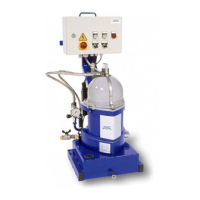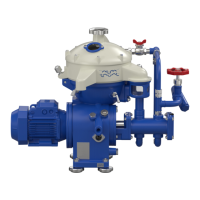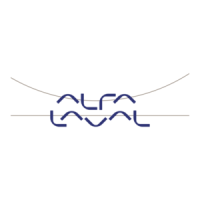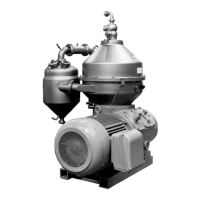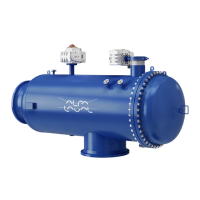Do you have a question about the Alfa Laval MOPX 310TGT-24 and is the answer not in the manual?
Essential safety guidelines and warnings for operating the separator, crucial for user protection.
Explains fundamental principles, design, and functions of the separator for user understanding.
Details the procedures for correct and safe operation of the separator.
Covers routine checks, maintenance, and servicing procedures for the separator.
Provides step-by-step instructions for disassembling and reassembling the separator components.
Offers guidance on diagnosing and resolving common operational issues and faults.
Contains technical data, drawings, and specifications for detailed reference.
An alphabetical listing of topics for quick reference and navigation within the manual.
Explains the core principles of liquid separation using centrifugal force and gravity.
Details the mechanical design, components, and functional aspects of the separator system.
Describes the operational characteristics of the purifier and clarifier bowls during separation.
Provides definitions for key terms and concepts used throughout the manual for clarity.
Outlines the essential steps and procedures for operating the separator correctly and safely.
Details the schedule and procedures for routine preventive maintenance tasks to ensure reliability.
Provides templates and guidelines for logging maintenance activities and checks for record-keeping.
Lists critical inspection points and procedures for Intermediate Service (IS) to ensure proper function.
Lists critical inspection points and procedures for Major Service (MS) for in-depth maintenance.
Provides instructions and precautions for safely lifting and moving the separator components.
Details the methods and agents for cleaning the separator parts and system to maintain performance.
Explains the procedure and considerations for changing the lubricating oil in the separator.
Covers vibration analysis, its significance, and the use of vibration monitoring equipment for diagnostics.
Offers general guidance and best practices for common maintenance tasks and component care.
Provides an overview and general guidelines for dismantling and assembling the separator safely.
Details the procedure for dismantling and assembling the inlet/outlet and frame hood components.
Explains the steps for dismantling and assembling the bowl hood and disc stack, critical for separation.
Covers the dismantling and assembly of the bowl body and its operating mechanism, vital for function.
Provides instructions for dismantling and assembling the operating water device for maintenance.
Details the procedure for dismantling and assembling the vertical driving device, a major component.
Details the procedure for dismantling and assembling the horizontal driving device, a major component.
Explains the dismantling, cleaning, inspection, and assembly of the optional feed pump.
Addresses common mechanical problems such as vibration, noise, speed, and starting issues.
Helps diagnose issues related to liquid flow and separation effectiveness during purification and clarification.
Focuses on resolving problems specific to purification, like separation results and water content.
Addresses issues related to clarification performance, such as separation results and oil in water.
Provides solutions for issues related to the optional vibration switch's functionality and settings.
Lists the essential technical specifications and performance data for the separator and its operation.
Presents basic dimensional drawings of the separator excluding pump connections for installation planning.
Details the connections and their requirements for the separator without a pump.
Presents basic dimensional drawings of the separator including pump connections for installation planning.
Details the connections and their requirements for the separator with a pump.
Describes the interface between the separator and control systems, including definitions and signal processing.
Specifies the required water quality parameters to prevent damage and ensure separator performance.
Provides information on recommended lubricating oils, greases, and their application for maintenance.
Includes various supplementary drawings such as motor details, foundations, and safety labels.
Covers guidelines for proper storage, transport, and installation of the separator.
| Brand | Alfa Laval |
|---|---|
| Model | MOPX 310TGT-24 |
| Category | Water Filtration Systems |
| Language | English |
